
Environmental Engineering and Management Journal
Scope & Guideline
Exploring innovative pathways in environmental management.
Introduction
Aims and Scopes
- Environmental Remediation:
Research dedicated to the development and assessment of techniques for the removal or neutralization of pollutants from the environment, including studies on bioremediation and the use of adsorbents derived from agricultural waste. - Water and Wastewater Management:
Focus on innovative methods for treating water and wastewater, including electrocoagulation, constructed wetlands, and biological treatment processes, aimed at improving water quality and sustainability. - Sustainable Resource Management:
Exploration of sustainable practices in waste management, including recycling, waste-to-energy technologies, and the circular economy, with an emphasis on reducing environmental impacts. - Climate Change and Environmental Impact Assessment:
Studies assessing the impacts of climate change on environmental systems and the effectiveness of various mitigation strategies, including carbon emission reduction and resource efficiency. - Ecological Engineering and Management:
Research exploring the integration of ecological principles into engineering practices, such as habitat restoration, biodiversity conservation, and ecosystem service assessments. - Renewable Energy and Green Technologies:
Investigation of renewable energy sources and green technologies, focusing on their environmental benefits, efficiency, and integration into existing systems.
Trending and Emerging
- Microplastics and Emerging Contaminants:
Research on microplastics and other emerging contaminants has surged, reflecting growing concerns about their environmental and health impacts. - Digital Technologies in Environmental Management:
The integration of digital technologies, such as remote sensing, GIS, and machine learning, in environmental monitoring and management is gaining traction, emphasizing data-driven approaches. - Circular Economy Practices:
There is an increasing focus on circular economy practices, including waste valorization and sustainable resource management strategies that seek to minimize waste and maximize resource efficiency. - Climate Adaptation Strategies:
Research addressing climate adaptation and resilience strategies is becoming more prominent, highlighting the need for innovative solutions in response to climate change impacts. - Sustainable Urban Development:
Emerging studies on sustainable urban development practices, including green infrastructure and urban resilience, are trending, reflecting the importance of sustainable city planning.
Declining or Waning
- Heavy Metal Pollution Studies:
Research specifically targeting heavy metal pollution has decreased, suggesting a shift towards broader environmental issues like microplastics and organic pollutants. - Traditional Waste Disposal Methods:
There is a noticeable reduction in studies focusing on conventional waste disposal methods, as emphasis has shifted towards innovative recycling and resource recovery strategies. - Chemical Treatment Solutions:
Papers centered on chemical treatment methods for pollution control are becoming less frequent, as the journal increasingly favors biological and eco-friendly approaches. - Local Case Studies without Broader Implications:
While local case studies remain relevant, there is a declining trend in publications that do not connect to broader environmental management frameworks or global sustainability goals. - Agricultural Impact Studies on Soil Quality:
Research specifically examining the impacts of agriculture on soil quality is waning, possibly indicating a shift towards integrated studies that encompass environmental, social, and economic dimensions.
Similar Journals
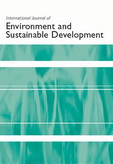
International Journal of Environment and Sustainable Development
Exploring solutions for environmental resilience.The International Journal of Environment and Sustainable Development, published by INDERSCIENCE ENTERPRISES LTD, serves as a vital platform for researchers, practitioners, and policymakers engaged in the multidisciplinary fields of geography, renewable energy, and environmental sustainability. With an ISSN of 1474-6778 and an E-ISSN of 1478-7466, this journal has been disseminating critical research since its inception in 2002 and continues to expand its scope through 2024. Recognized within the Q3 quartile in Geography, Planning and Development and Q4 in both Management, Monitoring, Policy and Law and Renewable Energy, Sustainability and the Environment, it provides valuable insights into contemporary issues affecting our planet. While access options are limited to non-open access formats, the journal remains essential for those seeking to enhance their understanding of sustainable development practices and policies in a global context. The International Journal of Environment and Sustainable Development is not only an academic repository but also a catalyst for dialogue and innovation within the environmental sciences.

Engenharia Sanitaria e Ambiental
Fostering collaboration for a sustainable tomorrow.Engenharia Sanitaria e Ambiental is a distinguished journal published by the Associação Brasileira de Engenharia Sanitária e Ambiental and has been an influential resource in the fields of sanitation and environmental engineering since its inception. With an Open Access format established in 2004, it ensures that invaluable research is freely accessible to a global audience, supporting the dissemination of knowledge and innovation. Based in Brazil, the journal addresses critical issues surrounding waste management and environmental sustainability, contributing significantly to the discourse in these areas. Although currently ranked in Q4 within its category as of 2023, it serves as a platform for emerging research and aims to elevate the standards of environmental science education and practice. Researchers, professionals, and students alike benefit from its commitment to enhancing the understanding of sanitary and environmental challenges, making it an essential resource for those striving to contribute to a healthier and more sustainable world.

Asian Journal of Water Environment and Pollution
Transforming water science through interdisciplinary research.Asian Journal of Water Environment and Pollution is a leading academic journal published by IOS PRESS, dedicated to advancing the field of water science and technology, as well as pollution management. With its ISSN 0972-9860 and E-ISSN 1875-8568, this journal serves as a pivotal platform for researchers, professionals, and academics alike who are keen to explore innovative solutions and interdisciplinary approaches toward water-related challenges and environmental issues. Although currently positioned in the Q4 category for both pollution and water science & technology, the journal aims to foster impactful research and discussions that can enhance the understanding and treatment of water pollution. The Asian Journal of Water Environment and Pollution not only plays a crucial role in disseminating knowledge but also encourages the sharing of findings from unique geographic perspectives, particularly from Asia. As the field evolves, this journal is poised to become a vital resource for those looking to contribute to sustainable water management practices and pollution reduction strategies.
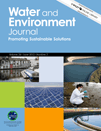
WATER AND ENVIRONMENT JOURNAL
Empowering voices in water and environmental science.WATER AND ENVIRONMENT JOURNAL is a prominent interdisciplinary journal dedicated to the latest research and advancements in the fields of water resources, environmental engineering, and pollution management. Published by WILEY, the journal has established itself as an essential resource for academics, practitioners, and policymakers since its inception in 1987. With an impressive impact factor reflecting its robust influence, it ranks in the Q2 and Q3 quartiles across multiple categories, including Water Science and Technology, Environmental Engineering, and Management, Monitoring, Policy and Law. The journal welcomes high-quality research articles, reviews, and case studies that address the critical challenges facing water and environmental sciences. As an open access publication, it provides a platform for widespread accessibility and engagement, ensuring that the knowledge generated is disseminated to a diverse audience. With a commitment to advancing understanding and solutions in water-related issues, WATER AND ENVIRONMENT JOURNAL plays a crucial role in shaping the future of environmental research and technology.

Resources Environment and Sustainability
Championing Interdisciplinary Dialogue in Environmental ResearchResources Environment and Sustainability is a premier academic journal published by ELSEVIER, dedicated to advancing knowledge in the fields of environmental science, engineering, and sustainability practices. Recognized for its rigorous peer-review and high-quality research, the journal boasts an impressive impact factor and consistently ranks in the first quartile across multiple categories, including Environmental Engineering, Environmental Science, Management, Monitoring, Policy and Law, and Pollution. With its Scopus rankings placing it among the top journals—#7 in Environmental Science and #12 in Environmental Engineering—this journal provides a vital platform for researchers, professionals, and students seeking to contribute to evolving policies, innovative management strategies, and cutting-edge environmental solutions. Hosted in the Netherlands, Resources Environment and Sustainability is committed to fostering interdisciplinary dialogue and disseminating high-impact research that addresses the pressing challenges of our times. This journal embraces open access principles, ensuring that the wealth of knowledge it publishes remains accessible to a global audience.
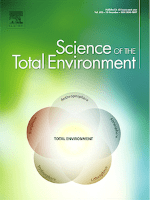
Science of The Total Environment
Advancing Environmental Knowledge for a Sustainable FutureScience of The Total Environment, an esteemed journal published by Elsevier, holds a significant position in the field of environmental science, encompassing critical areas such as Environmental Chemistry, Environmental Engineering, Pollution, and Waste Management and Disposal. With an impressive impact factor and ranked in the Q1 quartile across its categories for 2023, the journal is recognized for its high-quality research output and contribution to environmental sustainability. Operating from its base in the Netherlands, the journal has been a valuable resource since its inception in 1972, welcoming innovative studies that address complex environmental challenges. Its notable rankings—such as Rank #9 in both Environmental Sciences and Pollution—underscore its relevance and influence in the academic community. Although the journal currently does not provide an open access option, the robust findings and discussions presented within its pages continue to foster a deeper understanding of environmental issues. Science of The Total Environment is an essential platform for researchers, professionals, and students dedicated to advancing knowledge and solutions in the rapidly evolving field of environmental science.
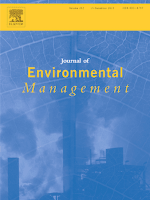
Journal of Environmental Management
Leading the dialogue on pressing ecological issues.The Journal of Environmental Management is a leading peer-reviewed journal dedicated to advancing knowledge and research in the fields of environmental science, management, and policy. Published by Academic Press Ltd - Elsevier Science Ltd, this esteemed journal has been pivotal since its inception in 1973, providing a platform for innovative research, critical reviews, and insightful discussions surrounding pressing environmental issues. With an impressive impact factor placing it in the Q1 category across multiple disciplines—including Environmental Engineering and Waste Management—it ensures that published works are highly regarded and widely disseminated. Furthermore, its Scopus rankings reflect its prominence, being in the top percentile within its categories, which highlights the journal's influence on shaping environmental policies and practices. While the journal does not currently offer Open Access, it remains a crucial resource for researchers, professionals, and students committed to fostering sustainable management solutions. By continually addressing emerging challenges in environmental management, the journal serves as an essential reference point for academics and policymakers alike.
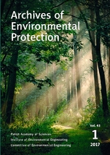
Archives of Environmental Protection
Exploring Solutions for Environmental ChallengesArchives of Environmental Protection, published by the Polish Academy of Sciences, is a pivotal journal in the field of Environmental Science. With an ISSN of 2083-4772 and E-ISSN of 2083-4810, this journal serves as a critical platform for disseminating innovative research and comprehensive reviews that address the complexities surrounding environmental issues. As of 2023, it holds a respectable Q3 ranking in Environmental Science, reflecting its relevance and contribution to the academic community, indicated by a Scopus rank of 124 out of 233 in the General Environmental Science category. Although it operates without Open Access, the journal's consistent publication from 2007 to 2024 emphasizes its commitment to advancing knowledge in diverse areas of environmental protection. Researchers, professionals, and students are encouraged to engage deeply with the wealth of insights offered through the rigorous peer-reviewed articles presented in this journal, which strive to foster sustainable practices and environmental stewardship.

Clean Technologies and Environmental Policy
Innovating policies for a cleaner, healthier planet.Clean Technologies and Environmental Policy is a prestigious journal published by Springer, dedicated to advancing the field of environmental science through the lens of sustainable technology and policy-making. Since its inception in 2004, the journal has carved out a significant niche within the academic community, boasting an impressive impact factor reflective of its quality, as evidenced by its ranking in the Q1 and Q2 categories across various disciplines, including Environmental Engineering and Business, Management and Accounting. With a focus on innovative approaches to managing environmental challenges, the journal covers a wide array of topics from management strategies in environmental engineering to methodologies in policy development. This comprehensive scope positions it as an essential resource for researchers, professionals, and students seeking to contribute to the dialogue on sustainable development and environmental stewardship. Although it operates without Open Access, the journal ensures rigorous peer review and timely publication of high-quality research, facilitating the dissemination of knowledge necessary for informed decision-making in the ever-evolving field of environmental science.

Water Conservation Science and Engineering
Exploring Interdisciplinary Approaches to Water ManagementWater Conservation Science and Engineering, published by SPRINGERNATURE, is a vital academic journal dedicated to advancing the fields of environmental engineering, ocean engineering, waste management, and water science and technology. Since its inception in 2016, the journal has quickly established itself within the academic community, achieving a commendable Q3 ranking across multiple categories in 2023. With an ISSN of 2366-3340 and an E-ISSN of 2364-5687, it is accessible to a global readership eager to explore the latest research and innovations in water conservation and sustainable practices. Although currently not open access, the journal is committed to publishing high-quality scholarly articles that provide insights into effective water management strategies, innovative engineering solutions, and the critical importance of preserving our water resources. Based in Singapore, Water Conservation Science and Engineering aims to foster interdisciplinary collaboration among researchers, professionals, and students, making it an essential resource for anyone passionate about environmental sustainability and preservation.